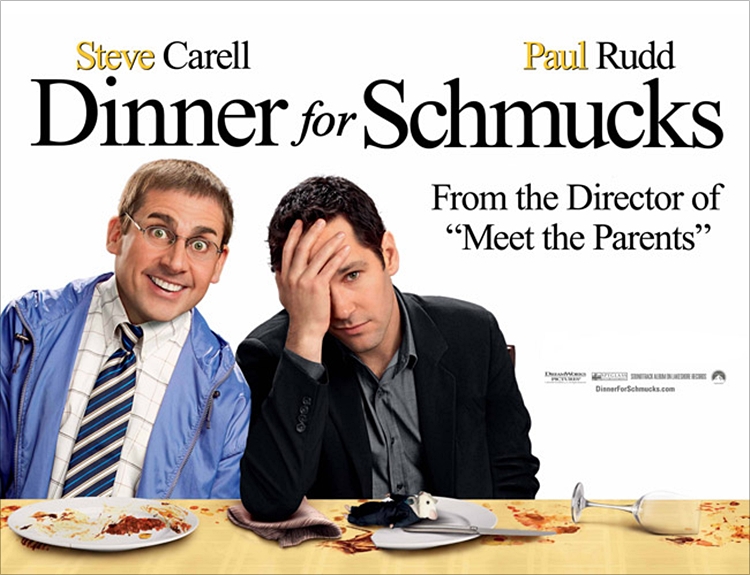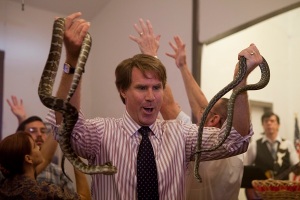Originally Posted July 20th, 2010
When major decisions are determined by thin margins, it’s easy to ask oneself, “What if…?” Take, for example, the presidential election of The United States in 2000, a race that was, at one time, separated by less than two hundred votes. What if the machines in Volusia County hadn’t gone haywire and altered the voter tallies? What if the ballots hadn’t been double sided and so hard to punch? What if there had been a film that explained what was going on in a way that even a political dunce like myself could understand? After watching Recount, I have an answer for the last question, but more importantly, those first two questions become uncomfortable, even dispiriting, to consider.
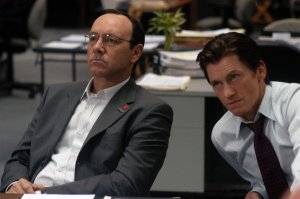
Recount has a tricky line to walk - it needs to recreate the events of the Florida recount in a manner that's entertaining, but also truthful. Based on extensive research and countless interviews with nearly all the key figures, Jay Roach’s film plants the viewer right in the heart of both the Republican and Democratic campaigns, as each party tries to wrest the outcome of the election away from the other. Centring the film is Kevin Spacey as Ron Klain, the Gore campaign's prodigal son, whose shot at political restoration fuels his no holds barred approach to getting the votes counted. Spacey is backed by a bevy of other seasoned actors who, in addition to being universally convincing, also look eerily similar to their real life counterparts.
Scenes hastily jump back and forth between party camps as they respond to rulings and polls, with each group trying to outmanoeuvre the other. By showing the reactions on both sides, Recount is able to clearly communicate to the viewer the importance, if not always the details, of the day's battle. Easily the greatest strength of the film is how it manages to make mounds of political jargon and legal proceedings not only understandable, but exciting. Numerous court rulings concerning the validity of a dimpled chad (voting bubble) have the weight of a referee decision in overtime. There are so many small victories for each side that every ruling and arbitration feels like a another sway in the direction of an all-out war for the White House.
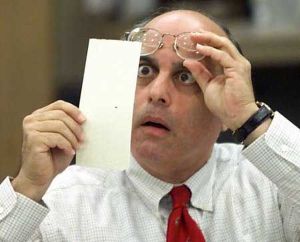
While the film wants to be taken seriously as a factual re-enactment, much of Recount’s impact comes from how well it dramatizes seemingly inconsequential events. When indication is first given that something is wrong with the voting machines, there’s a frantic race to stop Gore from giving his concession speech. It’s all heightened for dramatic purposes, but it’s certainly entertaining. Similarly heart-pounding is the appearance of a mob at one of the recount centres, where Bush supporters assault a Gore lawyer carrying a sample ballot. Again, it’s engaging because such confrontations actually happened. But as the adaptation elements begin to overtake the documentary ones, it becomes clear that anyone looking for a neutral appraisal should look elsewhere.
Recount’s only real failure is that in taking a dramatic look at the California recount, it loses its chance at being a balanced take on the events. It can be hard to blame the film though, because in reality the Democrats were, from the get-go, in a more sympathetic position. While the Gore campaign was broadcasting the idealistic motto of “every vote counts”, the Republicans had to respond by stopping the counting of invalid votes, even though they had by all accounts won. Just about every court and legislative body concerned with the recount at that time was either Republican, or somehow associated with Bush. Again, these are facts that simply enhance the perception that Gore is somehow fighting uphill against impossible odds. The Democrats come off as the scrappy underdogs while the Republicans can’t escape the appearance of having tried to not so stealthily pull the wool over the public’s eyes. Though the film can be forgiven for any opinion generated by the circumstances of the recount, certain dramatic elements only serve to reinforce the feeling that the creators are coming at the material with a strong opinion of their own.
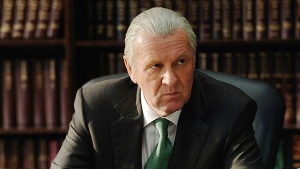
By anchoring the story around the Gore campaign’s leader, any semblance of impartiality goes out the window. There’s some backstory given about Klain and Gore’s uneasy partnership in the past, but that history serves only to make the audience sympathetic with Klain’s attempts to redeem himself. There’s no one to humanize the Republican side the way Klain does for the Democrats. While the film makes a point of indicating that Klain was more interested in the votes being counted than the actual winner, he’s still the nice guy trying to make good, and you want him to succeed. The only person on the Republican bench given adequate screen time is Laura Dern as then Florida Secretary of State Katherine Harris, who comes across as more of a preening debutant than an elected official.
It’s the subtleties of how the Republican Party is treated that are more concerning. Every action by a Bush supporter feels much more cloak and dagger than anything done by the liberals, and there’s an air of subterfuge about every closed door meeting and late night rendezvous. Even the Bush campaign camp, led by a Dr. Pepper chugging Tom Wilkinson, feels more based on caricatures, thanks to an almost entirely white, crew-cut sporting army of lawyers. The Bush camp contrasts heavily with the more ethnically diverse Gore crew, which operates more like a team. It’s often hard to tell where the re-enactment part of the film ends and the dramatic elements begin. It’s not the fault of the creators that they have an opinion, it just feels like any approach that isn’t apolitical is a betrayal of the authenticity that the film flirts with.
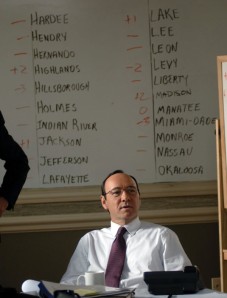
HBO was smart to approach Recount as a made for TV-movie as opposed to a big screen release. The election of Barrack Obama was mere months away, and it seems doubtful that people would pay to watch a movie about the difficulties of simply casting a vote. It’s a reminder of a period many have forgotten, but for others, would reopen the old wounds of a power transfer that looked less like an election and more like a barbaric tug-of-war. Yet, Recount’s timely release is all the more important because even though its politics aren't so subtle, it's good to know that, yes, every vote matters.
4 out of 5
Directed by Jay Roach
2008, USA


